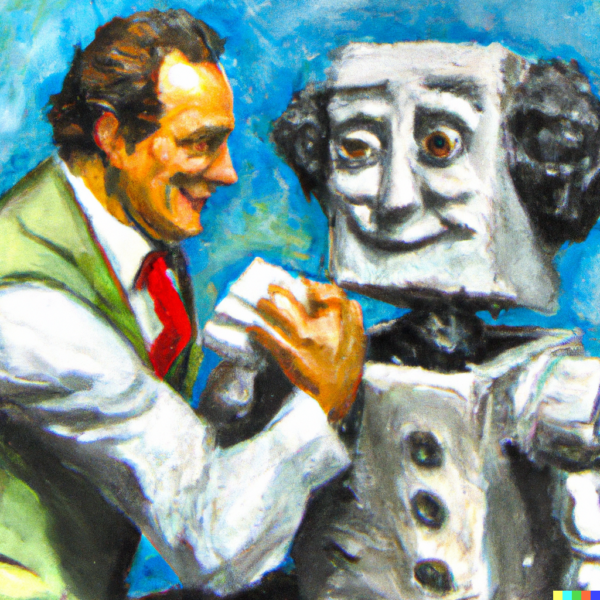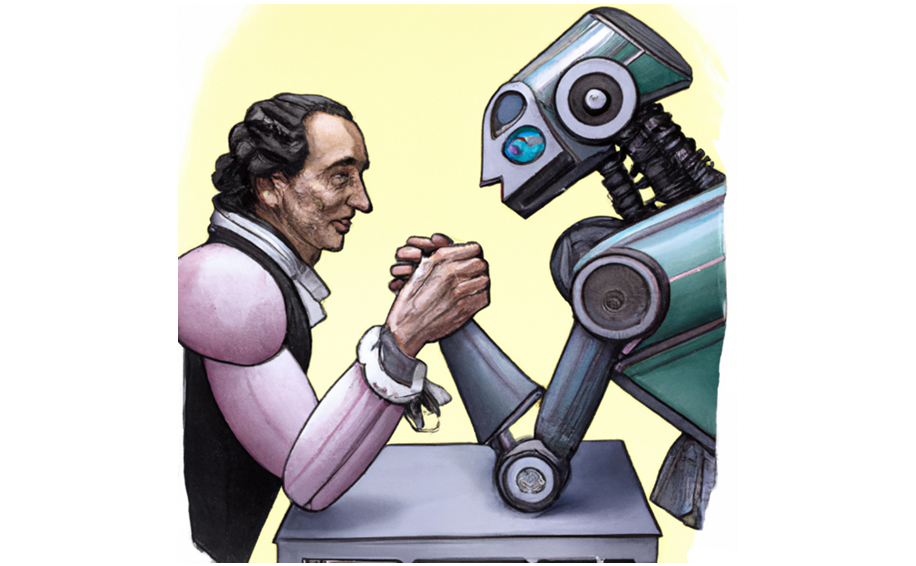Among revolutionary thinkers, Thomas Paine (1737-1809) is one of the most famous. In the current era of robotic automation and artificial intelligence, Paine’s argument for ever-greater sharing of society’s riches is worth thinking about.
How can Paine’s writings from over 200 years ago help us find the way forward in a world of ChatGPT?
Paine’s 1776 pamphlet “Common Sense” galvanized colonists’ support for the American Revolution. His 1791 book “The Rights of Man” defended the French Revolution against conservative critics such as Edmund Burke.
But one of Paine’s lesser-known writings, his very last pamphlet, “Agrarian Justice” (1797) is as revolutionary as the two more well-known works.
In this short treatise Paine put forward a detailed proposal for what we would now call Social Security, a system of income supports for the elderly and the disabled. Unlike Social Security, Paine also proposed income grants for young people starting out in life as adults.
The revolution in social thinking begun by Paine with “Agrarian Justice” is an unfinished revolution. The compelling justification that Paine offers revolutionizes our understanding of the individual’s role in economic production. It has profound implications for how we should organize our society.
Paine has a lesson to teach us in the present day.
An individual’s productive contribution to society is small compared to the productive natural and technological assets that no living human created.
The lion’s share of a society’s economic production is a lucky windfall, largely made possible by natural resources and past inventions for which no current society member can claim credit. These windfall benefits deserve to be widely shared among ALL those who take part in production, not just among those at the top.
As technology’s power increases and its productive contribution grows larger over time, individuals’ contributions shrink as a percentage of the whole and the case for an ever-greater sharing of society’s riches becomes overwhelmingly strong.
Of course, robots and artificial intelligence were far from Paine’s mind.

Although the Industrial Revolution was beginning, Paine’s society was still largely an agrarian one. As a result, Paine focused on the productive assets of the earth: soil, sun, and rain.
Paine’s observation is both fundamental and obvious: no human created these natural assets. He argues that the earth’s land should be considered the common property of humanity. Private property arises as a necessary compromise to the impracticalities of a universal common property in land. Paine notes:
“[A]s it is impossible to separate the improvement made by cultivation from the earth itself upon which that improvement is made, the idea of landed property arose from that inseparable connection; but it is nevertheless true, that it is the value of the improvement only, and not the earth itself, that is individual property.”
Paine’s key insight is that you have a property right claim to the “value added” portion of production, the small amount that traces back to your initiative rather than to the productive capacity of land itself.
Paine extends the point further. The productive capacity of society itself must be considered, alongside the productive capacity of land:
“All accumulation, therefore, of personal property, beyond what a man’s own hands produce, is derived to him by living in society; and he owes on every principle of justice, of gratitude, and of civilization, a part of that accumulation back again to society from whence the whole came.”
A wealthy individual owes their wealth in part to land they didn’t create. They owe their wealth in part to a society they also did not create. We are beneficiaries of a natural inheritance, and we are also beneficiaries of a social inheritance.
What is included in this social inheritance?
Paine does not elaborate.
But it is easy to imagine that it includes social institutions such as a functioning political and legal system; roads, buildings, energy systems; cultural capital in patterns of tolerance, trust, adherence to the law; and prevailing levels of technology.
Within these lists, technology stands out as the most dynamic item.

This has been true since the advent of the Industrial Revolution. But technological innovation is now poised to grow even more dynamic and pose new problems.
Introduced in December 2022, the ChatGPT chatbot is beginning to upend education. According to Fortune magazine, companies are already replacing employees with ChatGPT. Artificial intelligence is now capable of writing computer code. Once it can improve its own code, rapid exponential strides in AI capabilities will unfold, for good or bad.
ln the future — perhaps even the near future — the vast majority of production will be technologically driven with comparatively minor human inputs.
Humans will enjoy vast wealth. But these spoils will largely be the fruits of a “technological soil” that none of them created, just as Paine noted centuries ago that farm harvests are the fruits of a natural soil.
Paine was right to insist that the natural bounty of the soil should be shared among all in society, not just among the private owners of the soil. We might conclude that our technological bounty must likewise be widely shared.
What form this sharing should take is an open question.
Should it take the form of a “universal basic income,” or in-kind vouchers for important goods such as education, housing, food security, or something else?
These are difficult questions. We must answer them.
Perhaps an AI chatbot will help us in that task!
Craig Duncan is a professor of philosophy at Ithaca College and Chair of the Department of Philosophy & Religion, with specialties in political philosophy, ethics, and the philosophy of religion. He also is the Coordinator of the Legal Studies Program at Ithaca College. In addition to authoring various journal articles, he is the co-author (with Tibor Machan) of “Libertarianism: For and Against” (2005). He wrote the “Against” half of the book!
The images were generated by Dall-E2, an AI art generator created by the company OpenAI (the same company that created ChatGPT). The prompts given to Dall-E2 were “Thomas Paine arm wrestling a robot,” “a Matisse cut-out of Thomas Paine arm wrestling a robot,” and “impressionist painting of Thomas Paine arm wrestling a robot.”

